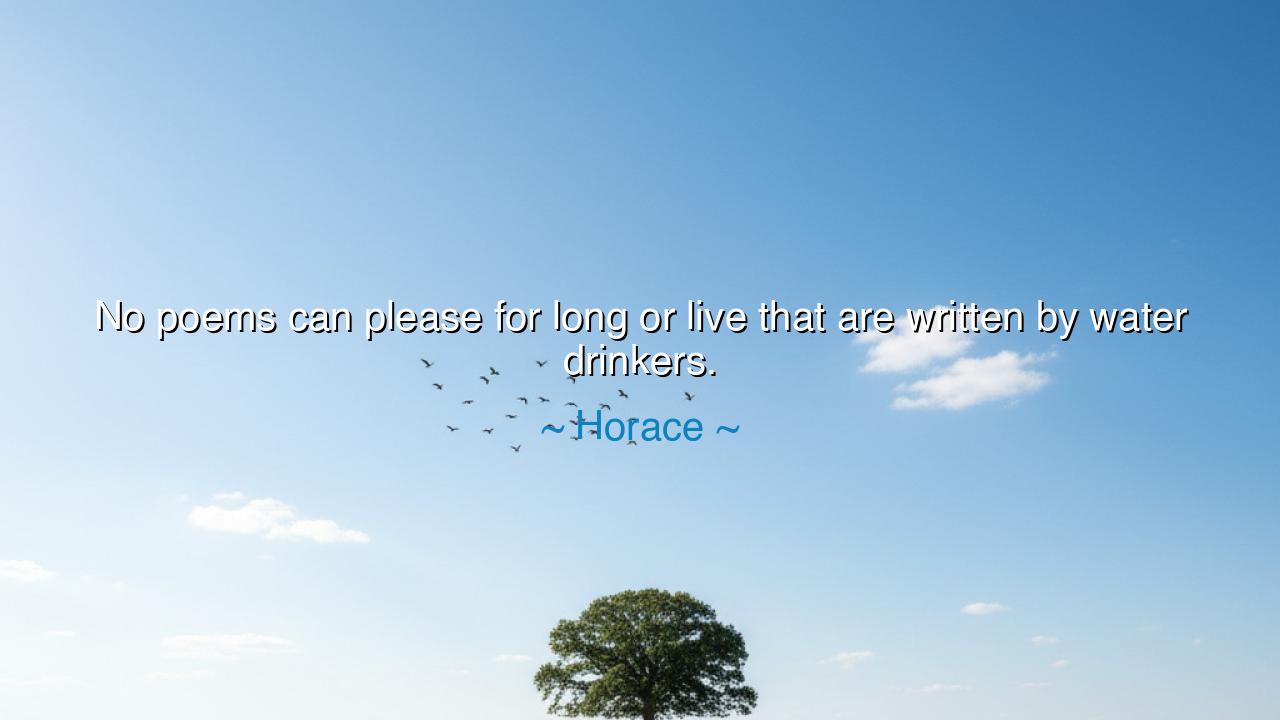
No poems can please for long or live that are written by water






“No poems can please for long or live that are written by water drinkers.” Thus spoke Horace, the Roman poet, whose words cut through time with both humor and severity. At first glance, this line seems a jest against sobriety, a playful jab in favor of wine. But beneath its laughter lies a deeper truth: that poetry—and by extension, all true art—demands intoxication, fire, and passion. It cannot be birthed from tepid hearts or timid souls. The water drinker, content, cautious, and measured, may live safely, but he will not create works that endure. Only those who drink deeply of life’s ferment, whether through wine, love, sorrow, or vision, can craft lines that live beyond their own breath.
The ancients knew that wine was more than drink; it was symbol. Dionysus, god of the vine, was also the god of ecstasy, frenzy, and inspiration. To drink of his cup was not merely to grow drunk—it was to break free of limits, to feel the pulse of the divine in the blood, to speak words not entirely one’s own. Horace, like many before him, tied poetry to this spirit of divine madness. For he believed that the mind loosened by passion could touch truths hidden from the calculating eye. The water drinker, cool and cautious, might be virtuous—but his verses would wither, lacking the fire that comes only from daring excess.
History confirms this. Consider Lord Byron, who lived recklessly, loved passionately, and fought in wars far from home. His life was as tempestuous as his verse, and though he often walked the edge of ruin, his poems still thunder across the centuries. Would Byron’s words have survived had he lived as a careful, modest man, sipping water in quiet restraint? Unlikely. His art was nourished by the same storm that consumed him. This is what Horace meant: that greatness in art requires a measure of intoxication, a surrender to forces larger than prudence.
Even in politics and action, we find the same truth. Look to Winston Churchill, whose words in Britain’s darkest hours were themselves poems of defiance. He was no water drinker, no cautious bureaucrat. He drank, he raged, he burned with appetite for life. And because he lived with such intensity, his speeches carried the intoxication of the soul, stirring millions to courage. Here, again, Horace’s wisdom shines: it is not moderation that moves the world, but passion, often wild, sometimes dangerous, always unforgettable.
Yet we must be wise in our reading. Horace does not command literal drunkenness alone, but the greater intoxication of spirit. To “drink wine” in his metaphor is to embrace experience, to risk, to taste the fullness of existence. It is to be moved by love, shaken by grief, exalted by wonder. The water drinker, who avoids passion and hides from life’s storms, may remain safe, but his art will never strike fire in another’s soul. A poem that pleases only for a moment, then fades, is the child of caution. A poem that lives forever is born from ecstasy.
The lesson for us is clear: do not live as a water drinker. Do not let your days pass in cautious neutrality, untouched by joy or sorrow. Seek experiences that intoxicate the soul. Allow yourself to be moved, to feel, to burn. And then, from that flame, create—whether in words, in deeds, or in the shaping of your life. For only that which is forged in fire can endure the winds of time.
Therefore, children of the future, remember Horace’s wisdom: poetry that endures is the fruit of passion, not restraint. Drink deeply—not only of the vine, but of love, of struggle, of beauty, of grief. Let your soul be stirred to the point of madness, for from that madness comes the music that will live when your voice is gone. Better to burn brightly and leave behind immortal words, than to sip gently of water and vanish without a trace.






QCBui Thi Quynh Chi
It’s interesting how Horace implies that poetry written by ‘water drinkers’ lacks longevity. Does he mean that great art requires a certain level of indulgence or even chaos? Could the ‘water drinkers’ be a metaphor for people who play it safe, avoiding the emotional highs and lows that come with a more intense lifestyle? Or is Horace just making a point about passion and experience—arguing that true art comes from those who live fully?
TDTrinh Dang
Horace seems to be making a bold statement about the quality of art coming from certain lifestyles. Is he suggesting that those who lead more temperate or restrained lives can’t create lasting poetry? I’m curious—why would drinking water, a symbol of purity and simplicity, be associated with mediocrity in poetry? Could it be that Horace is criticizing a certain kind of plainness in thought or experience, rather than the act of sobriety itself?
VNVan Nguyen
This quote from Horace seems to suggest that the best poetry comes from those who have lived deeply, perhaps indulging in life's pleasures or struggles. But is this fair? Can’t simple, everyday experiences provide inspiration for great art too? Maybe Horace is making a point about the importance of passion and intensity, but what about poets who find beauty in stillness, in the quiet moments of life? Shouldn't their work also have value?
NMBao ngoc Mai
Horace’s statement about water drinkers and poetry is an interesting one. I can’t help but wonder if he’s implying that great poetry comes from experiences beyond the mundane, or even from indulgence and excess. Does this mean that only those who’ve lived intensely—who’ve tasted life’s extremes—can produce truly memorable art? Is poetry, then, about depth and richness of life, or could there be value in a more simple, sober perspective?